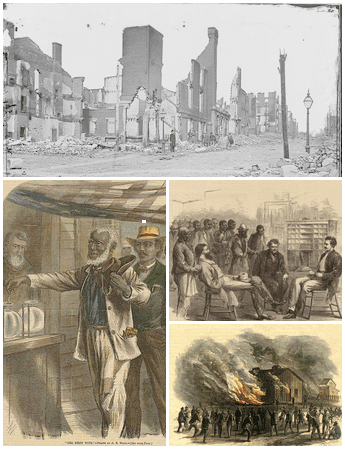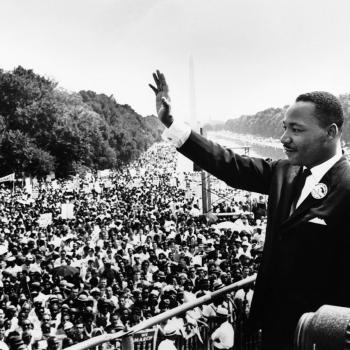
The philosopher George Santayana remarked that those who do not understand history tend to repeat it. I was reminded of this statement in view of a recent conversation. If we don’t understand the history surrounding Reconstruction after the Civil War, we may be repeating some of the same heinous, historical mistakes.
The person who encouraged me to reflect back on Reconstruction is Rev. Dr. LeRoy Haynes, Jr. This week, Dr. Haynes and I met for lunch in downtown Portland. I have known Dr. Haynes for many years and have found his perspective on civil rights issues invaluable, and for good reason. Dr. Haynes is the author of God’s Prophet in Non-Violence: The Story of Dr. Martin Luther King Jr.’s Life. In addition to his longstanding service as a pastoral leader in the Christian Methodist Episcopal Church, The Portland Observer wrote concerning him: “An acclaimed civil rights activist in Texas before moving to Portland, he served as a youth organizer for Martin Luther King Jr.’s Southern Christian Leadership Conference ; was a field organizer for the Student Non-Violent Coordinating Committee; and was co-founder of the Texas Black Panther Party.” His civil rights activism continues into the present on matters pertaining to the collective well-being of people across the region and nation on such matters as racism, poverty, and healthcare. Recently, he was voted into the Oregon Historical Society. So, when Dr. Haynes encourages me to consider a matter from racialized American history to understand the present, I am wise if I take the matter to heart.
Now for those of us who may be wondering what Reconstruction was, Encyclopedia Britannica offers this helpful definition:
Reconstruction, in U.S. history, the period (1865–77) that followed the American Civil War and during which attempts were made to redress the inequities of slavery and its political, social, and economic legacy and to solve the problems arising from the readmission to the Union of the 11 states that had seceded at or before the outbreak of war. Long portrayed by many historians as a time when vindictive Radical Republicans fastened black supremacy upon the defeated Confederacy, Reconstruction has since the late 20th century been viewed more sympathetically as a laudable experiment in interracial democracy. Reconstruction witnessed far-reaching changes in America’s political life. At the national level, new laws and constitutional amendments permanently altered the federal system and the definition of American citizenship. In the South, a politically mobilized black community joined with white allies to bring the Republican Party to power, and with it a redefinition of the responsibilities of government.
Put positively, Reconstruction was the first significant attempt to address racial inequities after the emancipation of America’s slave population. No matter how it is framed, though, it is worth noting that the KKK arose in response to Reconstruction in the effort to suppress and terrorize the recently emancipated African American slaves and all those who sought to aid them in their full inclusion in American society.
Dr. Haynes and I spoke of recent issues that stand in the way of full inclusion in our society today, such as the Supreme Court’s 2013 overturning of an essential aspect of the Voting Rights Act (Refer here and here). As a historical refresher, the Voting Rights Act of 1965 was intended to award the federal government the authority to safeguard against discrimination in voting practices on the state level. We also discussed the rise of white nationalism, as well as mass incarceration serving as the vehicle for what Michelle Alexander refers to as The New Jim Crow.
Given the limits of space, in what follows, we will discuss briefly the rise of white nationalism. In April 2019, a Pew study claimed that the “Public has negative views of the country’s racial progress; more than half say Trump has made race relations worse.” The study also claimed “Most Americans say it’s now more common for people to express racist or racially insensitive views; more than four-in-ten say it’s more acceptable.”
Whether true or not, a new study conducted by researchers at the University of Pennsylvania claims that “Racial prejudice has declined as a reaction to Trump’s presidency, a new study suggests.” The study is not arguing that the President is wrongly accused of making racist statements and fostering a racist ideology, but rather that his assertions are having the reverse effect of what is often expected. A May 24th Washington Post article focusing on the new research claims that President Trump’s racist rhetoric is leading people away from his orientation and stated opinion. The article reads,
There are two ways that effect might play out, the study observes. One is normalization, whereby members of the public would feel more comfortable expressing racist beliefs that they always harbored but once felt were outside the mainstream. The other is so-called opinion leadership, whereby the public would be moved to adopt racist positions advanced by political elites.
Instead, the authors found evidence of an altogether different effect — people actually moving away from the positions embraced by those in power.
Time will tell if the U Penn study meets with wide-ranging appeal. What it does point to in the interim concerns whether the President is having the impact his comments are presumably intended to convey. Surely we should be encouraged if indeed the majority of Americans are standing up rather than capitulating to expressing racist views or advancing racist positions. Even so, no matter if the greater percentage of Americans are leaning in the opposite direction of the President at the present time, public opinion can change suddenly. What we can learn from Reconstruction in this instance is that no matter how successful racial equity appears to be in the early going, one must never let down one’s guard. If we are not vigilant, and simply going with the flow, then President Trump’s racially charged rhetoric has a real chance of regaining momentum, just as was true of the racist reactions by many across the land following Reconstruction’s early successes.
















